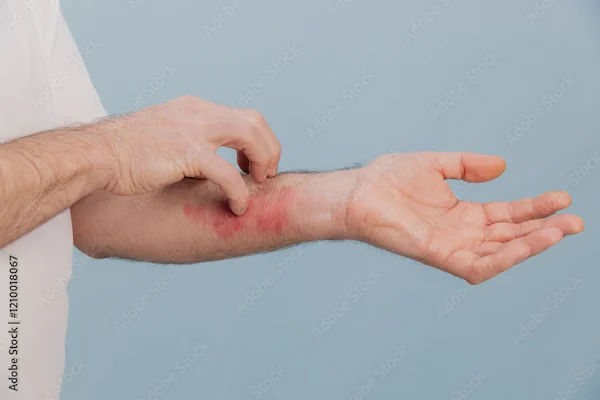How To Cure Psoriasis Permanently?
Psoriasis is a chronic, autoimmune disease that affects millions of people worldwide. It causes skin cells to multiply at an accelerated rate, leading to red, scaly patches that can be itchy, painful, and emotionally distressing. Given the visible nature of the disease, many individuals with psoriasis often wonder: How To Cure Psoriasis Permanently?

Written by Dr Sonia Bhatt
Last updated on 13th Jan, 2026
While there is no definitive cure for psoriasis, there are various treatment options that can manage symptoms effectively and help people live better, more comfortable lives. Advances in medical treatments have allowed many individuals to experience long-term relief from symptoms.
However, the fact remains that psoriasis is a chronic condition, meaning that it can flare up unpredictably, and there is no permanent solution that can completely eliminate it from the body.
In this article, we will explore why psoriasis does not have a permanent cure, the treatments available to manage the condition, and how lifestyle changes and effective management strategies can provide significant relief.
Why Is There No Permanent Cure for Psoriasis?
Psoriasis is not just a skin condition; it is a systemic autoimmune disorder where the immune system malfunctions and mistakenly attacks healthy skin cells. This abnormal immune response causes the skin cells to regenerate too quickly, resulting in the red, inflamed patches known as plaques.
There are several factors that make it difficult to completely cure psoriasis:
1. Genetic Factors
Psoriasis tends to run in families, and genetic predisposition plays a significant role in its development. The condition is associated with specific genetic markers, particularly in genes related to the immune system, such as the HLA-Cw6 gene. These genetic markers increase the likelihood that an individual will develop psoriasis if they are exposed to certain environmental triggers.
However, even individuals with a genetic predisposition may never develop psoriasis. This highlights that genetics alone do not determine the onset of the condition. This interaction between genetics and environmental factors makes it challenging to pinpoint a single "cure."
2. Immune System Dysfunction
Psoriasis is fundamentally an autoimmune condition, where the body’s immune system becomes overactive and begins attacking its own tissues. In this case, the immune system targets the skin, causing excessive skin cell turnover. T-cells, which are white blood cells that normally help fight infection, become hyperactive and trigger inflammation in the skin. This immune system dysfunction is complex and is the primary reason why psoriasis is difficult to cure.
Even though modern treatments can reduce inflammation and regulate immune activity, they do not address the root cause of the immune dysfunction, which means that psoriasis can return at any time when triggered.
3. Environmental Triggers
Psoriasis can be triggered or worsened by environmental factors like stress, infections, injuries to the skin, certain medications, and even changes in weather. These triggers can cause flare-ups, even when psoriasis is in remission. Since these environmental factors can vary widely from person to person, and because they are unpredictable, it makes the disease even more challenging to cure permanently.
Available Treatments: Managing Psoriasis Effectively
Although there is no permanent cure for psoriasis, several treatment options are available to manage the condition effectively. These treatments can help reduce symptoms, control flare-ups, and improve the quality of life for those living with psoriasis.
1. Topical Treatments
Topical treatments are the first line of defence for mild to moderate psoriasis. These include:
Topical Steroids: These anti-inflammatory creams are the most commonly prescribed treatment. They reduce redness, swelling, and itching by calming the immune system's overactive response.
Vitamin D Analogues: These medications, such as calcipotriene, help slow down the rapid turnover of skin cells, preventing the buildup of scaly plaques.
Coal Tar: A traditional treatment for psoriasis, coal tar can help reduce inflammation, scaling, and itching. It is often used in combination with other treatments.
Topical Retinoids: These Vitamin A derivatives help normalize skin cell growth and are often used to reduce plaque buildup.
Salicylic Acid: Helps remove scales and smoothen the skin.
While topical treatments are effective for mild psoriasis, they may not be sufficient for moderate to severe cases.
2. Systemic Treatments
When psoriasis is moderate to severe, systemic treatments that affect the whole body may be necessary. These include:
Oral Medications: Drugs such as methotrexate, cyclosporine, and acitretin can help suppress the immune system and slow skin cell turnover. These are typically prescribed for moderate to severe psoriasis.
Biologic Treatments: Biologics are a newer class of drugs that target specific parts of the immune system. These are typically administered through injections or infusions and include medications such as TNF inhibitors, IL-17 inhibitors, and IL-23 inhibitors. These treatments work by targeting the inflammatory molecules in the immune system that drive psoriasis, offering a long-lasting effect.
Biologic treatments have shown promise in long-term management and can even induce remission in some patients, where the symptoms are significantly reduced or absent for an extended period. However, they come with a higher cost and the need for regular injections or infusions.
3. Phototherapy
Phototherapy involves exposing the skin to ultraviolet (UV) light under medical supervision. This treatment can slow down skin cell turnover and reduce inflammation. Types of phototherapy include:
UVB Phototherapy: Uses UVB light to treat widespread psoriasis.
PUVA: Combines psoralen (a light-sensitizing medication) with UVA light.
Phototherapy is effective for many individuals, especially for widespread psoriasis or when topical treatments alone haven’t been successful. However, it requires regular visits to a dermatologist and can increase the risk of skin cancer with prolonged use.
Can Psoriasis Go into Remission?
While there is no permanent cure for psoriasis, many patients can achieve long-term remission with the right treatment plan. Remission is a period during which symptoms of psoriasis are minimal or absent. Some people experience remission for months or even years, especially with biologic treatments or effective combination therapies.
During remission, patients may experience a significant reduction in symptoms such as itching, redness, and scaling. However, flare-ups can still occur, often triggered by affecting factors like stress, infections, or environmental changes.
Lifestyle Modifications to Support Psoriasis Treatment
Although there is no cure for psoriasis, certain lifestyle changes can help control symptoms and reduce the frequency of flare-ups. These include:
1. Stress Management
Since stress is a common trigger for psoriasis flare-ups, finding ways to manage stress is essential. Techniques such as meditation, yoga, deep breathing, and mindfulness can help reduce stress levels and improve overall health.
2. Dietary Adjustments
A link exists between diet and psoriasis, as certain foods can trigger flare-ups. Alcohol, spicy foods, and high-sugar foods are commonly identified as triggers. On the other hand, an anti-inflammatory diet rich in omega-3 fatty acids, fruits, vegetables, and whole grains may help reduce inflammation and improve overall skin health.
3. Skin Care
Keeping the skin moisturized is essential for managing psoriasis. Dry skin can lead to irritation and worsen symptoms. Using fragrance-free, gentle moisturizers and avoiding harsh soaps can prevent skin from becoming dry and flaky.
4. Quitting Smoking and Reducing Alcohol Consumption
Smoking is known to increase the severity of psoriasis, while excessive alcohol intake can trigger flare-ups. Quitting smoking and limiting alcohol can improve treatment outcomes.
Conclusion: Living with Psoriasis
While psoriasis may not be permanently eradicated, many individuals can manage their symptoms effectively and even experience extended periods of remission. If you are living with psoriasis, it is important to work closely with your healthcare provider to create a personalized treatment plan. Whether through topical treatments, phototherapy, systemic therapies, or lifestyle adjustments, there are many ways to reduce symptoms, control flare-ups, and improve your quality of life.
Consult Top Dermatologist
Consult Top Dermatologist
Dr. Mayuri Jain
Dermatologist
11 Years • MBBS, MD Dermatology , Venereology & Leprosy
Delhi
Dr Mayuri Jain Clinic, Delhi
Dr. Kavitha Killaparthy
Dermatologist
23 Years • MBBS,DIPLOMA(DERMATOLOGY,VENEREOLOGY,LEPROSY)
Hyderabad
JDS Skin & Hair Clinic, Hyderabad
Dr.j Girishma
Dermatologist
6 Years • MBBS MD DERMATOLOGY
Bengaluru
Apollo Medical Center, Marathahalli, Bengaluru

Dr Ekansh Shekhar
Dermatologist
10 Years • MBBS MD
Lucknow
Apollo Clinic Hazratganj, Lucknow
Dr. Praveen Kumar
Dermatologist
5 Years • MBBS, MD DVL
Yenugonda
SVS Hospital ., Yenugonda

